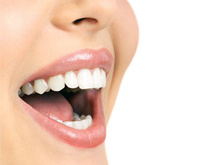Health Topics
-
Healthy Living
-
|
|
August 2010
|
| Do You Grind Your Teeth? |
| Dr. Ashish Kakar |
| |
 |
Teeth grinding may happen at any time, and some people grind their teeth in their sleep! Worse, they may not even know they're doing it. |
Maybe the windmills of the gods grind slowly, but if you don’t do something to stop your teeth grinding (bruxism), you could end up with flattened, grooved and worn-down teeth, which could be cracked, with chipped enamel; or worse, with loosened teeth. If something isn't done to stop the damage, teeth grinding may lead to jaw muscle or joint problems and even loss of your teeth. The causes are not clear. Stress is one possible cause, but often the reason for the habit is not known.
4 Fix-its
Your dentist and you can decide how best to treat your teeth-grinding problem.
- Mouth Guard is a plastic device that fits over your teeth. It protects them from grinding damage. This is worn at those times when you're most likely to grind your teeth.
- Stress Reduction may help relax your jaw muscles and make grinding less likely. Your dentist may suggest regular exercise or other ways to reduce stress.
- Medication may be given in some cases. It may help relieve sore muscles or reduce stress.
- Fixing damaged teeth, if you’ve been a long time grinder, your teeth should be looked into. Crowns and onlays are two ways to fix damaged teeth.
Wearing a Mouth Guard
A mouth guard can help protect your teeth from damage due to grinding. Because many people need to wear one at night, it is also called a night guard. The guard is custom-made out of plastic. It may fit over your top or bottom teeth. Wear your mouth guard exactly as your dentist instructs. Also, be sure to care for your mouth guard properly, like instructed:
- Rinse the guard before wearing it and after removing it from your mouth.
- Brush it gently with a toothbrush and toothpaste or liquid soap after removing it.
- Soak the guard in water when you're not wearing it, unless told otherwise.
- Soak the guard in denture cleaner ever so often to help keep it fresh.
Check your guard for signs of wear. Show it to your dentist at each checkup. Mouth guards may wear down and need to be repaired or replaced.
|
Do You have These?
- A sore, tried jaw
- Dull headaches
- Earaches
- Sensitive teeth
Symptoms like these may be a signal that you grind your teeth. |
|
 |
Dr. Ashish Kakar is Senior Consultant Dental Surgen & Oral Implantologist at Apollo Indraprastha Hospitals, New Delhi |
|
|